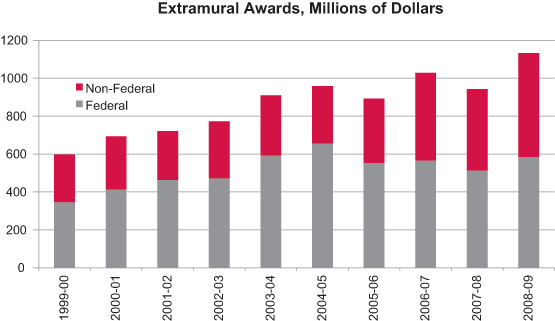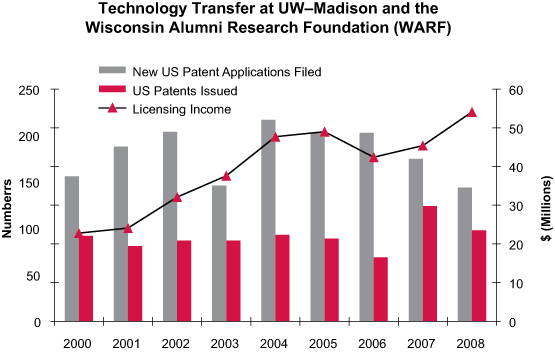First-Year Progress Report
Priority: Invest in scholarly domains in which we have existing or potential strength and impact
Achievements related to research begin with UW–Madison’s ranking as third in the country for research expenditures — a key measure of one of the university’s core missions. As one of the nation’s largest and most prolific public research universities, the UW enjoys global recognition for work ranging from stem-cell discoveries to K–12 educational policies and the special challenges of postsecondary education.
Through the Great Lakes Bioenergy Research Center, a grant bringing in over $125 million to the state, the UW is a national leader in bioenergy exploration. The College of Agricultural and Life Sciences is active in interdisciplinary, cross-campus collaborations in research areas including food safety, microbiology, global food security, sustainable energy, and childhood obesity. The School of Business is reallocating resources in two of its strongest areas of research — marketing and real estate — and supporting interdisciplinary work related to entrepreneurship and international programming. The School of Nursing is developing new technologies for personal health records and creating assess points for work with minority or disadvantaged communities. The College of Engineering sponsors 43 research centers or institutes and 16 industrial consortia that together involve nearly 300 companies. Engineering faculty, staff, and students were inventors or co-inventors on 155 invention disclosures during fiscal year 2008 alone. Continuing Studies is exploring partnerships and programming related to health issues related to aging and care for the aging.
Cross-campus initiatives include hundreds of interdisciplinary research efforts addressing topics ranging from the effects of poverty to political campaigns to online consumer behavior. In support of these activities are efforts to reorganize and strengthen research and graduate education leadership and policy, recognizing that this already complex environment continues to grow and evolve.
In addition, departments and units related to the humanities engaged the campus in events and performances through a Year of the Humanities and developed a comprehensive plan that enables greater alignment of resources and fosters research collaboration. Following an extensive assessment, more than 140 faculty members in arts-related units have developed a detailed proposal for a College of the Arts.
The new Wisconsin Institutes for Discovery, opening later this year, will be a model for interdisciplinary research in complex problems, featuring architectural designs that foster these collaborations. Together with the three-tower Wisconsin Institutes for Medical Research, scheduled for completion in about 2015, the campus will be poised to continue its leadership in engaging across disciplines to address the problems facing Wisconsin and the world.
Supporting charts
Note: If you are unable to read the charts below, please contact the Office of Quality Improvement. Staff there will help explain the content of any chart in this progress report.

